Project pillars, studio culture, and the final five per cent: Halo’s lead concept artist takes Gary Evans behind the scenes of the AAA-franchise

You work as a concept artist at video games developer 343 Industries. You’ve just finished designing a vehicle for the new Halo. You’re pleased with it, this assault vehicle. You like the energy weapon, the anti-gravity propulsion system, the hatch on top that covers the player. It’s functional, but it looks good too. At least, you think it looks good.
You take your concept into a meeting with the rest of the team. Somebody speaks up. A fellow concept artist doesn’t like your design. This person’s got a problem with your hatch, that part of the vehicle that covers the player. They don’t think it looks good at all. In fact, they think it’s ugly.
So you and your fellow concept artist look to the head of the table, to Darren Bacon, lead concept artist on the Halo franchise. He thinks for a minute, then points at something stuck up on the wall – an overriding idea that helps guide the production process. He’s pointing at a “project pillar”.
“If a project pillar is ‘gameplay first,’” the American says, “it’s easier for a team designing a vehicle with a disputed ‘ugly’ hatch on top to know what action to take. To solve the discrepancy, the teams knows, at a project level, that the gameplay function of being able to cover the player is more important than some aesthetic preference. Therefore, they can make the right decision for the project, knowing what’s most important according to the pillar.”
THE GOOD, THE BAD AND THE UGLY
This story is from the {{IssueName}} edition of {{MagazineName}}.
Start your 7-day Magzter GOLD free trial to access thousands of curated premium stories, and 9,000+ magazines and newspapers.
Already a subscriber ? Sign In
This story is from the {{IssueName}} edition of {{MagazineName}}.
Start your 7-day Magzter GOLD free trial to access thousands of curated premium stories, and 9,000+ magazines and newspapers.
Already a subscriber? Sign In
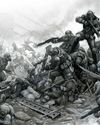
PAINT EPIC BATTLES IN TRADITIONAL INK
Warhammer illustrator THOMAS ELLIOTT shows you how to create an epic science fiction fight scene with this step-by-step guide
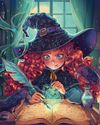
CONJURE MAGIC ILLUSTRATIONS
Daria Anako demonstrates her process for creating a whimsical piece of art with some spellbinding touches
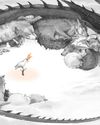
First Impressions
We discover the early influences that inspired the artist
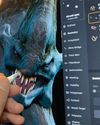
ZBrush for iPad
GAME CHANGER The desktop version of popular 3D sculpting software ZBrush has been redesigned for iPad - and it's brilliant

BenQ GW2786TC
GET AN EYEFUL Don't scrimp out on your health with a monitor that's kind on the eyes and good for creative tasks
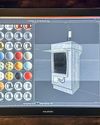
Huion Kamvas Pro 19
TABLET WARS An attractive pen display does an excellent job of balancing price and performance as it sets out to challenge its rivals in the mobile marketplace
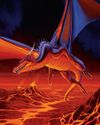
DRAGON OFORCEC
Legendary D&D artist Larry Elmore explains the keys to crafting timeless fantasy art.
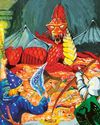
DUNGEON MASTERS
ImagineFX marks the milestone 50th anniversary of the launch of Dungeons & Dragons with a look at its rich tradition of illustration
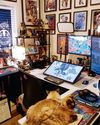
Erik Ly
Gamer's haven Why the artist enjoys a maximalist aesthetic more than the minimalist approach.

2D meets 3D: How the workflows are merging
Interdimensional As VFX and animation evolve and tools become more accessible, Tanya Combrinck asks whether the separation between the mediums is reducing